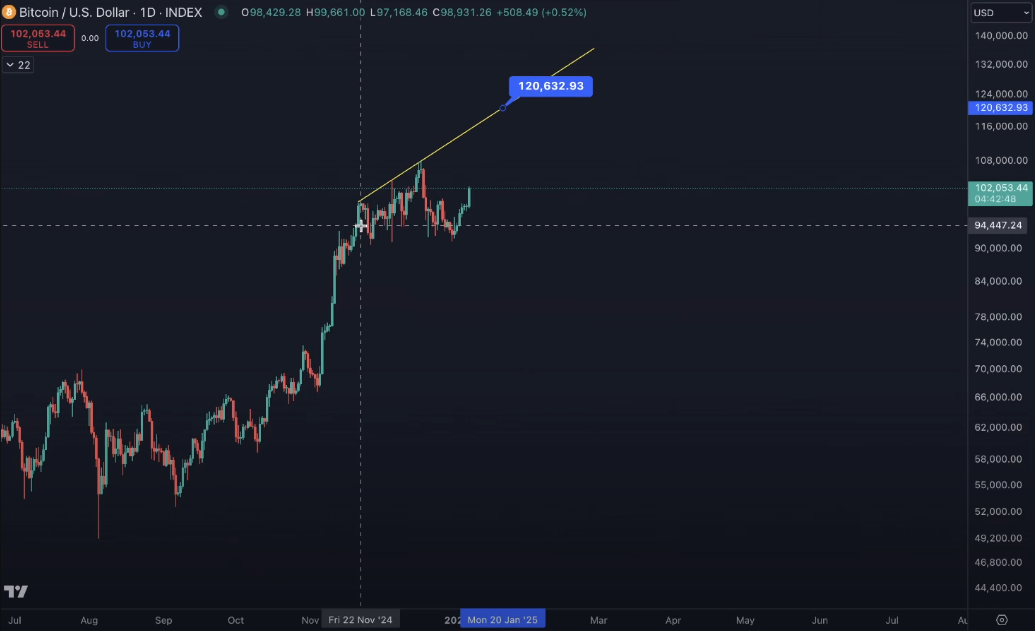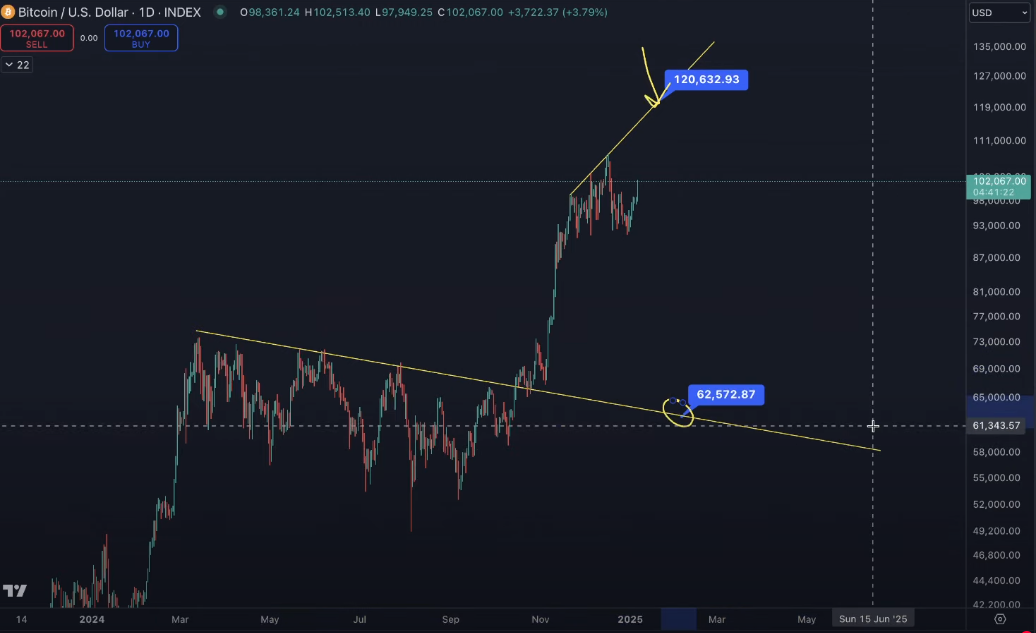News
Tether, top crypto exchange to swap $1b USDT to Tron network
Published
2 days agoon
By
admin

Tether and a top third-party cryptocurrency exchange have announced a chain swap that will move $1 billion USDT from other blockchains to the Tron network.
On Jan. 6, stablecoin issuer Tether posted on X that it plans to coordinate with a major exchange to facilitate the chain swap.
According to the announcement, the coordination will see Tether and the exchange convert a portion of the third party provider’s Tether (USDT) held in cold wallets to the Tron (TRX) network. The USDT will be swapped from different blockchains.
Tether’s USDT is available on multiple blockchains, including Ethereum, Tron, and Solana. The stablecoin issuer clarified that the chain swap will not impact the total supply of USDT.
Chain swaps involve the movement of crypto from one blockchain to another.
This is key to the trading market as it helps traders to use their digital assets on any of the supported blockchains. Tether’s flagship stablecoin is a major player in the crypto industry, with billions of dollars traded daily as users tap into it for payments, trading and cross-border transactions.
USDT holders can transact without the inherent volatility that largely characterizes the crypto market.
The stablecoin is pegged 1:1 to the U.S. dollar and currently dominates the sector across the ecosystem with over $137 billion in market cap. Circle’s USDC (USDC) is the second largest stablecoin with a market cap of $45.8 billion.
Data shows Tether’s 24-hour trading volume is around $102.5 billion, with this representing a 61% increase in the past 24 hours. USDC’s stands around $7.1 billion, up 80% in the past 24 hours.
While Tether contiues to lead the stablecoin space by market share, its market cap has recently suffered as European Union’s Markets in Crypto-Assets regulation came into full effect last December.
Source link
You may like


The Lightning Network Privacy Big Picture: Don't Forget the NSA


Digital banking giant Revolut joins Pyth Network


‘Very Dubious’ Speculation Suggests Bitcoin Could Follow Nasdaq ETF Rallies of 1999: Benjamin Cowen


How Will Donald Trump’s Tariff Plans Impact The Crypto Market?


Ledn Remains Bitcoin’s Premier Borrowing And Lending Platform


Analysts says Solana price to pass $500 In Q1, while this altcoin could rally 2,000%
Blockchain
Digital banking giant Revolut joins Pyth Network
Published
1 hour agoon
January 8, 2025By
admin

Revolut, the U.K.-based digital banking giant, is the latest company to join the Pyth Network as a data publisher.
The partnership between the Financial Conduct Authority regulated neobank and Pyth Network (PYTH) means Revolut will now contribute its price data to the blockchain-based oracle network, benefiting the growing decentralized finance ecosystem.
Revolut’s integration with Pyth comes as the gap between traditional finance and DeFi continues to narrow.
This trend has gained traction amid the increasing adoption of blockchain technology across financial technology and related ecosystems. The Pyth Network’s oracle solution plays a key role in this evolution as the platform seeks to expand alongside industry giant Chainlink (LINK). Both oracle networks aim to provide web3 users and institutions with enhanced transparency and reliability.
Mike Cahill, chief executive officer of Duoro Labs and a contributor to the Pyth Network, highlighted the growing recognition of digital assets and DeFi within traditional finance.
“Pyth’s collaboration with Revolut is part of a larger trend we’re seeing, where traditional banking institutions, trusted by millions of customers globally, are recognizing the value of decentralized finance and digital assets. Together, we are driving the future of finance, where transparent and reliable data empowers the next generation of financial applications,” he noted.
As a data publisher on Pyth Network, Revolut will contribute to Pyth’s price feeds, enhancing the security and reliability of decentralized applications. In turn, Pyth will leverage Revolut’s market expertise to provide accurate and dependable price feeds to dApps. For Revolut, the partnership marks a significant step in expanding its presence in the web3 space.
Launched in 2015, Revolut has grown to over 45 million users and offers its services in 200 countries. Meanwhile, the Pyth Network continues to expand, with more than 120 data providers, over 590 price feeds, and integration across 450 dApps.
Source link
Bitcoin
‘Very Dubious’ Speculation Suggests Bitcoin Could Follow Nasdaq ETF Rallies of 1999: Benjamin Cowen
Published
2 hours agoon
January 8, 2025By
admin
Benjamin Cowen is saying that the price action of Bitcoin (BTC) could mirror that of the Nasdaq exchange-traded fund (ETF) Invesco QQQ during the first 13 months that followed its launch about 26 years ago.
In a new video, Cowen tells his 855,000 YouTube subscribers that the QQQ ETF hit a local top after going up by 150% in roughly one year following the launch of the ETF.
The QQQ ETF tracks the performance of the 100 largest non-financial firms listed on the Nasdaq stock exchange.
As the flagship digital asset approaches the first anniversary since the launch of the spot Bitcoin ETF, Cowen says the crypto king could replicate similar price action, though it’s unlikely to “play out the exact same way.”
“In 1999 the QQQ ETF launched in March and it rallied from around $48 to $120. And that Rally from $48 to $120 took about 54 weeks – $48 to $120…
…if you look at Bitcoin’s ETF, it launched at around $48,000… if you look at the launch of the spot ETF for Bitcoin it wicked up to $48,000 instead of down to it like it did with the QQQ [ETF]. But interestingly enough, 54 weeks later is January 20th – Inauguration Day [of President-elect Donald Trump], which is interesting because 54 weeks after this launch of the QQQ, it was 54 weeks later the QQQ went from like $48 to $120.
Now look at this, if you go to Bitcoin on the daily time frame and you connect these highs here [$99,600, $104,100 and $108,200] and you just extend that out what’s fascinating is if you grab the sort of a price label and you go over to January 20th and go up to this trend line it would put you at $120,000 which is exactly what the QQQ did – it went from $48 to $120, 54 weeks later.”

Cowen says that if Bitcoin’s price action closely follows that of the QQQ ETF in the first 13 months of its existence, a 48% drop is a possibility.
“Obviously this is very dubious and obviously, we know that QQQ got a large drop after that…
…what I would be interested in is if Bitcoin finds itself at $120,000 at some point in a few weeks, what is the reaction there? And one potential outcome… basically what happened with the QQQ is after it hit $120, it had a large drop down to $63, which is a pretty big drop.”

Bitcoin is trading at $101,484 at time of writing.
?
Don’t Miss a Beat – Subscribe to get email alerts delivered directly to your inbox
Check Price Action
Follow us on X, Facebook and Telegram
Surf The Daily Hodl Mix
 

Disclaimer: Opinions expressed at The Daily Hodl are not investment advice. Investors should do their due diligence before making any high-risk investments in Bitcoin, cryptocurrency or digital assets. Please be advised that your transfers and trades are at your own risk, and any losses you may incur are your responsibility. The Daily Hodl does not recommend the buying or selling of any cryptocurrencies or digital assets, nor is The Daily Hodl an investment advisor. Please note that The Daily Hodl participates in affiliate marketing.
Generated Image: Midjourney
Source link
FSC
South Korea to allow institutional investors to trade crypto: report
Published
8 hours agoon
January 8, 2025By
admin

South Korea considers easing restrictions on corporate crypto trading, with plans to gradually issue real-name accounts to institutional investors.
South Korea is set to allow corporations to invest in cryptocurrencies as the Financial Services Commission is considering a gradual approach to lifting restrictions, Yonhap News Agency reports, citing the regulator. Under the plan, companies will be able to open real-name accounts on crypto exchanges, starting with non-profit organizations.
As of press time, South Korea’s crypto laws only allow retail investors with verified real-name accounts to trade. While there is no official ban on institutional investors, banks have been advised not to issue real-name accounts to corporations, the report notes. The FSC aims to change this, with plans to discuss the issue through the Digital Asset Committee.
The financial regulator also plans to introduce measures that will allow fintech companies to grow. The goal is to improve collaboration between financial groups and fintech firms. There will also be improvements in how crypto exchanges are regulated, especially regarding the listing of tokens and the handling of stablecoins.
Earlier in January, Chairman of the South Korea Exchange, Jeong Eun-bo, said the trading platform wants to “explore” crypto spot ETF approval in 2025 as reports indicate that the FSC also wants to allow companies to launch security token offerings.
In his speech at the the Securities and Derivatives Market Opening Ceremony 2025, Jeong said the exchange will “benchmark overseas cases for new businesses such as cryptocurrency ETFs and explore new areas in the capital market.”
Source link

The Lightning Network Privacy Big Picture: Don't Forget the NSA
Digital banking giant Revolut joins Pyth Network
‘Very Dubious’ Speculation Suggests Bitcoin Could Follow Nasdaq ETF Rallies of 1999: Benjamin Cowen
How Will Donald Trump’s Tariff Plans Impact The Crypto Market?
Ledn Remains Bitcoin’s Premier Borrowing And Lending Platform
Analysts says Solana price to pass $500 In Q1, while this altcoin could rally 2,000%
Pakistani Trader Kidnapped, Forced to Hand Over $340,000 in Crypto
Will BTC Recover After 2025’s First Crash?
South Korea to allow institutional investors to trade crypto: report
Accurate Indicator Hints Bitcoin’s Top Is Near
Bitcoin Plunges Below $100K Despite Positive Coinbase Premium Signal – What’s Next?

Bitcoin ETF inflows slump as BTC falls over 5% amid macroeconomic pressures

BlackRock Bitcoin ETF (IBIT) Sees $597M In Inflow, Saves the Day
Web 4.0 – Blockchain and AI Will Usher In a More Humane and User-Friendly Web

Democrats Should Reverse Their Stance On Bitcoin

Ethereum’s lowered yield might signal a paradigmatic shift in the ecosystem

Telegram users can send gifts to friends, TON fails to pump

Bitcoin Could Rally to $80,000 on the Eve of US Elections

Institutional Investors Go All In on Crypto as 57% Plan to Boost Allocations as Bull Run Heats Up, Sygnum Survey Reveals

Crypto’s Big Trump Gamble Is Risky

Arthur Hayes, Murad’s Prediction For Meme Coins, AI & DeFi Coins For 2025

A Kamala Presidency Could Be Just as Bullish for Bitcoin

Ripple-SEC Case Ends, But These 3 Rivals Could Jump 500x

SEC filing underway, Bitcoin rewards app Fold adopts FLD ticker

Cardano and the XRP price action lock in bulls vs bears battle as RCO Finance prepares for 3,000% surge

A16z-backed Espresso announces mainnet launch of core product

Tether CEO Paolo Ardoino Denies Rumors That Stablecoin Issuer Is Under Federal Investigation

Crypto Exchange OKX Moves To Support USDC Ecosystem by Adding Six New Trading Pairs

Trump’s Coin Is About As Revolutionary As OneCoin

Ripple Vs. SEC, Shiba Inu, US Elections Steal Spotlight
Trending

 DeFi3 months ago
DeFi3 months agoEthereum’s lowered yield might signal a paradigmatic shift in the ecosystem

 News3 months ago
News3 months agoTelegram users can send gifts to friends, TON fails to pump

 Bitcoin2 months ago
Bitcoin2 months agoBitcoin Could Rally to $80,000 on the Eve of US Elections

 Bitcoin2 months ago
Bitcoin2 months agoInstitutional Investors Go All In on Crypto as 57% Plan to Boost Allocations as Bull Run Heats Up, Sygnum Survey Reveals

 Opinion2 months ago
Opinion2 months agoCrypto’s Big Trump Gamble Is Risky

 24/7 Cryptocurrency News2 months ago
24/7 Cryptocurrency News2 months agoArthur Hayes, Murad’s Prediction For Meme Coins, AI & DeFi Coins For 2025

 Opinion3 months ago
Opinion3 months agoA Kamala Presidency Could Be Just as Bullish for Bitcoin

 Price analysis2 months ago
Price analysis2 months agoRipple-SEC Case Ends, But These 3 Rivals Could Jump 500x


